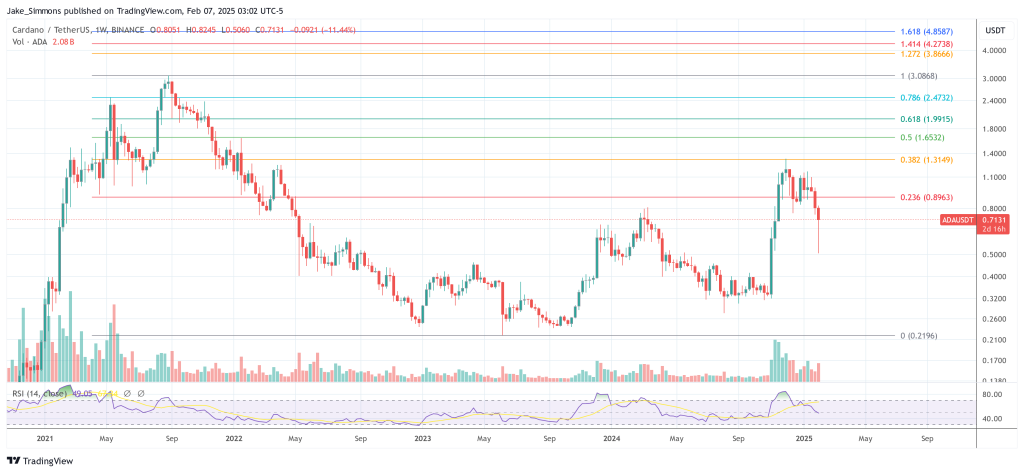Charles Hoskinson, founder of the Cardano blockchain, delivered an extensive live stream update outlining a major push toward decentralized governance. Hoskinson discussed the status of Cardano’s ongoing constitutional ratification, introduced details of a forthcoming roadmap, and explained a proposed budget overhaul—all aimed at ensuring that Cardano evolves without a centralized executive branch.
Cardano Roadmap And Budget
During the live stream, Hoskinson highlighted that the “constitution process [is] currently underway,” revealing a breakdown of active stake participation: Approximately 50% have voted “yes,” around 4.3% have voted “no,” and about 44% of the active stake has yet to vote.
According to Hoskinson, the community’s consensus appears to favor a “minimum viable governance” approach. Should the constitution pass, it will remain open to revisions: “We’re going to try really hard for kind of the next version—Constitution V2—and that’s a combination of working groups, workshops, and it gets more inclusive over time.”
He noted that the current momentum suggests a likely ratification date around February, barring any sudden influx of “no” votes.
In tandem with the constitutional process, Hoskinson outlined how Cardano’s roadmap will be ratified via on-chain governance. He confirmed that Input Output Global (IOG) and Intersect—an entity designed to facilitate governance—have each proposed versions of the roadmap. Key items expected to spark discussion include features like Ouroboros Leios and the development of multi-client architecture.
He also disclosed that IOG held a meeting with stake pool operators (SPOs) to delve into the roadmap details, signaling a collaborative effort: “We just actually had a meeting today with…SPOs about the roadmap as well.”
Hoskinson anticipates that “probably about mid-February” the spotlight will shift from constitutional matters to detailed debates on the roadmap’s technical trajectory.
By far the most contentious issue, Hoskinson said, involves the budget—where “money goes to Bob but sometimes money doesn’t go to Alice.” Recognizing the potential for disagreements, he underscored the importance of transparency and process: “Anytime [funding] happens, anybody on the loser side…tends to attack the legitimacy of the process as a whole. It’s what all budgets do.”
The budget process, as currently proposed, includes the possibility of multiple competing budget proposals. A working group composed of DReps (Decentralization Representatives) and the Constitutional Committee will gather, consolidate, and reconcile these competing proposals into a final candidate budget.
Hoskinson made clear that neither he nor IOG will unilaterally determine the outcome: “There will be a candidate budget that gets to be voted on…[the DReps and the Constitutional Committee] are the ones who decide with the budget.”
He also introduced the concept of funding coalitions, specifically highlighting a Development Ecosystem Coalition for core protocol work and an Ecosystem Coalition to support broader projects. With more projects seeking funding than available resources, Hoskinson expects heated debates, but stressed that “the winners and losers” are part of any budgeting exercise.
To quell concerns about misallocation or potential misuse, Hoskinson stated that audit and oversight is a foundational aspect of Cardano’s governance blueprint. Ideas range from using “smart contracts” for tracking expenditures to engaging external “audit agencies.” These measures, he said, aim to ensure both transparency and integrity for all stakeholders.
Perhaps the most striking element of Hoskinson’s plan is Cardano’s effort to operate without a formal executive branch. He likened Cardano’s governance structure to a legislative system combined with a judicial-like Constitutional Committee, but without the top-down approach typically seen in nation-states: “You’ll notice we only have two of the three [branches]…We just have a legislative branch and kind of have judicial with the Constitutional Committee, [but] the executive function is an emergent property of the people.”
Hoskinson noted that if Cardano succeeds under this model, it could set a transformative precedent: “If Cardano is successful…we’ve proven that for any governing structure—a corporation, a nation-state—you name it. Imagine the kind of world we could live in without CEOs and presidents and kings.”
Stating that he has “invested 10 years of [his] life” in Cardano, Hoskinson underlined the personal significance of seeing the platform achieve sustainable, decentralized governance: “If these things can occur on an annual basis, I could disappear for 20 years, come back, and Cardano will be 10 times the size…If [these governance mechanisms] can’t converge…unfortunately, the system will stagnate.”
At press time, ADA traded at $0.71.
















